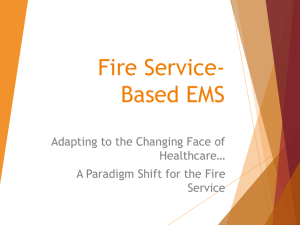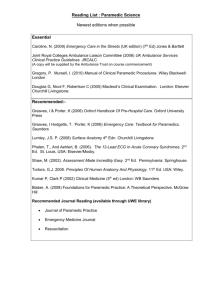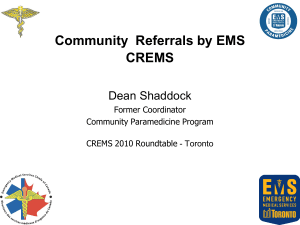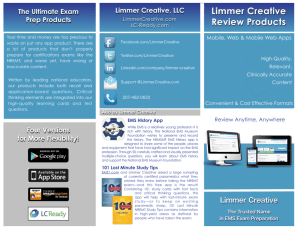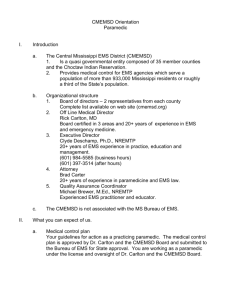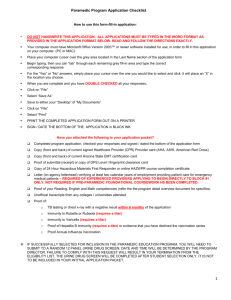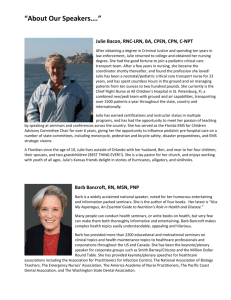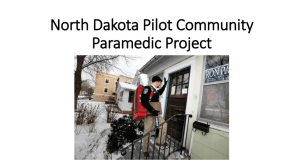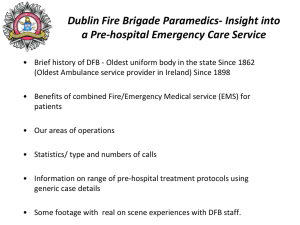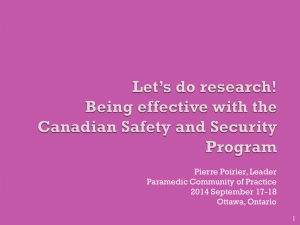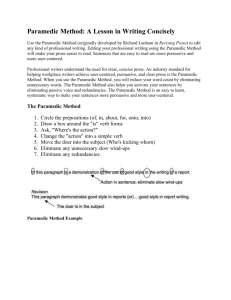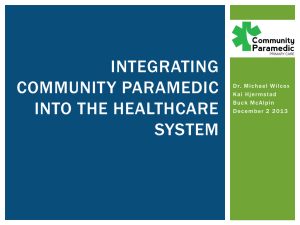Changing the Face of EMS in Wake County
advertisement
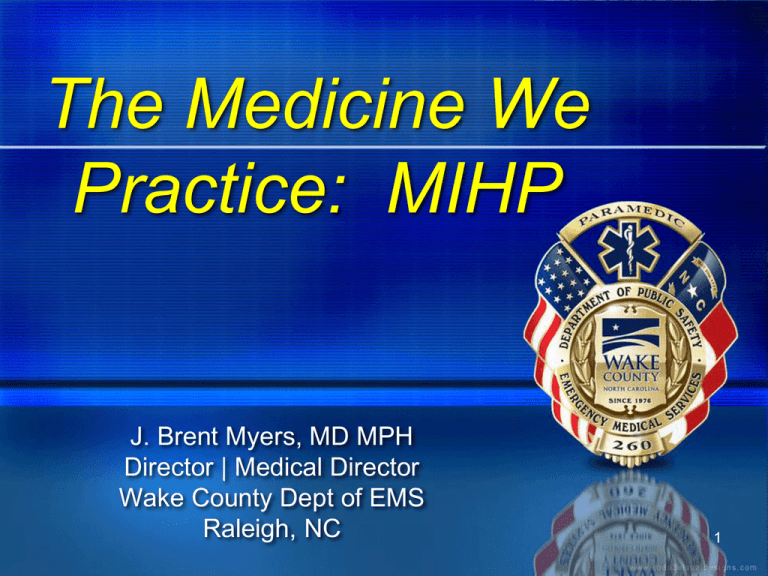
The Medicine We Practice: MIHP J. Brent Myers, MD MPH Director | Medical Director Wake County Dept of EMS Raleigh, NC 1 Disclosures No financial conflicts Nearly everything we talk about is off label, not FDA approved, and, therefore, makes clinical sense 2 Now Faith is the assurance Of things hoped for The belief in Things unseen. -- Hebrews 11:1 3 Atul Gawande Hot Spots “ [Dr} Brenner wasn’t all that interested in costs; he was more interested in helping people who had received bad health care. The people cycling in and out of the hospital were usually the people receiving the worst care.” 4 Acknowledgements Wake County LME Crisis and Assessment Unit (WakeBrook Campus) Wake Technical Community College Doctors Making Housecalls Capital Care Collaborative of Wake Healing Place Duke Raleigh, Rex Healthcare, WakeMed Health and Hospitals North Carolina Poison Center 5 NCOEMS The Three R’s Respond: Critical medical emergencies occur and require an experienced paramedic to mitigate Redirect: Not all patients need an emergency dept evaluation – experienced paramedics can help with destination decisions Reduce: Well-person checks for diabetic patients, CHF patients, etc. 6 Historical Scope of Service Respond to 911 Calls Treat in difficult environment Transport to Hospital E.D. Desired Scope of Service Reduce 911 calls in Special Populations •Repeat users (frequent flyers) •Diabetes •Pediatric Asthma •CHF •Homeless Respond to 911 Calls Treat in difficult environment Transport to Hospital E.D. Redirect •Treat/release from scene •Refer - get appointment •Transport elsewhere Risk-Frequency of EMS Interventions HIGH RISK LOW FREQUENCY Requires very experienced paramedic; Often requires more than one paramedic MODERATE RISK - TIME CRITICAL HIGH FREQUENCY May be safely handled by a paramedic with limited experience. LOW RISK HIGH FREQUENCY May not need to go to the hospital at all. Some risk due to lack of transport. Time Optimum Intervention for Critical Patient Condition Skills Experience 10 Ultra-Time Critical Experience Critical Skills Critical 11 Advanced Practice Paramedic An “advanced practice paramedic” provides a significantly better match between patient acuity and paramedic experience Experienced paramedic with additional training Assigned a “district” to cover Respond to critical calls Deliver services to reduce the number of calls Arrange alternative (not ED) health care where appropriate Non-transport vehicle 12 Advanced Practice Paramedic Advanced practice paramedic (APP) – limited number to ensure appropriate annual experience with high-risk patient encounters Response time goal of 14:59 at 90th percentile to supervise or performs high risk, low frequency procedures Expanded role Alternative transport decisions Preventative measures Advanced pharmacology JEMS September 2007, p 62-68 13 What Has Happened Thus Far 16 total Advanced Practice Paramedics for 1 million population (8 per shift) Goal for response is 14:59 at the 90th percentile – actual is 17:59 Traditional Paramedic 1 to 2 cardiac arrests per year APPs have seen 7 to over 30 per year 14 Historical Observations of EMS Destinations Insanity: Doing the same thing Over and over again and Expecting different results -Albert Einstein High Risk Refusals Called for 167 HRR Converted 50% to transports Of those not converted: 25 did not perceive themselves to be ill 2 would only go by private car 1 went to jail 50 had “other” issues On average, 35 minutes is required for conversion Non-Transport Follow-Up All patients who are not transported after refusal are placed on follow-up list for Advanced Practice Paramedics 5200 encounters with no transport were in the database Benefits Provides community health assistance (vaccines, well-being checks) in collaboration with Wake County Human Services Provide pre-planned disaster preparedness assistance (ventilator checks, O delivery) Intervene with “hot spot” frequent consumers of EMS (blood glucose checks, alternate destinations) Provide meaningful step on career ladder 2 21 Community Health Substance abuse/mental health (SA/MH) Direct transport to facility for mental health or substance abuse care Falls prevention/care Hypertension/CHF checks Diabetic checks Pre-plans (nursing homes, home health) 22 Alternative Destination Patient has primary mental health crisis and/or substance abuse Patient does not require sedation or demonstrate agitation APP will then contact alternative site and evaluate the patient for potential placement Alternative Destination Ambulance is returned to service <10 minutes 78% of the time This returned 120 unit hours to the EMS system Of patients screened, 32% ultimately “alternatively destinated” Screening Form Direct Transport for SA/MH Patient has primary mental health crisis and/or substance abuse Patient does not require sedation or demonstrate agitation APP will then contact alternative site and evaluate the patient for potential placement Exclusion Criteria Acute medical issue or trauma with bleeding, need for wound repair BAC >0.35 or patient too intoxicated to take po Pulse >120 Unexplained alteration in mental status Unable/unwilling to take medications for pre-existing conditions Exclusion Criteria Has taken medication outside of prescription/recommended dose and cannot be cleared by poison center Can perform ADLs independently Blood glucose < 300 with no evidence of DKA Alternative Destination 204 patients in a 12 month period were placed Mental health patients consume 14 ED bed hours on average (2,448 hours) Chest pain patients consume 3 ED bed hours on average Thus, we opened beds for 816 chest pain patients in the 12 month period This also saved ~$350,000 in total healthcare costs for this population The Ask EMS reimbursement tied to care provided rather than only to transport to the hospital emergency department Options: Modification of current Medicaid payment Pilot funding for certain projects Per member per month or other payment not based on episodes of care 34 Falls In Assisted Living Facilities 1 to 5 transports per day for our EMS system Majority are patients who are “found down” with no obvious injury or complaint Risk management strategy for the facility is to summon EMS for transport to the emergency department 35 Falls in Assisted Living Facilities Retrospective study complete: 644 falls in assisted living were reviewed 197 of these patients had a time-sensitive medical emergency Protocol would have identified 190 of the 197 Sensitivity then is 97% (93-98%, 95% CI) Bachman M et al. PEC 2013;17(1):111 [abstract] 36 37 Falls in Assisted Living Facilities 1500 such transports were made last year ~$2.5 million dollars in healthcare expense EMS is reimbursed only for transport to the hospital emergency department 38 Falls in Assisted Living Facilities Prospective evaluation had been underway for several months Public/private partnership with Doctors Making Housecalls (DMH) 300 + patients enrolled; over 50 falls with ½ remaining in the facility Common medical record with DMH On-going evaluation of safety and costs 39 Low Acuity Callers Data Driven triage score 1 very ill/injured 2 and 3 need prompt evaluation 4 and 5 – can safely go to the waiting room We are working to implement this scoring mechanism ~20% of our transports are level 4 and 5 (~$3.5 million in transport charges per year) 40 Metrics Patient satisfaction Safety 48 hour return to emergency department Adverse patient outcomes Cost avoidance 41 Summary Hot spots that are amenable to intervention in the EMS population exist The Advanced Practice Paramedic program is one method to improve care while reducing cost to the healthcare system Standardized measures to evaluate performance are the next challenge 42
